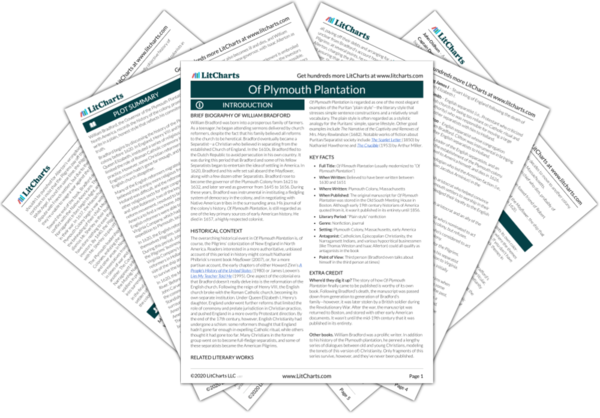Summary
Analysis
In the year 1620, the reformers have a contract to sail to Virginia. Their next task is to decide which of their number should sail first. Those who can settle their affairs most quickly are permitted to leave, but most of the congregants stay behind. It is decided that William Brewster will go to America, leaving Robinson behind.
It’s a sign of how many reformers stay behind in Holland that Robinson stays in Leyden, too: somebody needs to lead the reformers who haven’t yet made the voyage to America.
Themes
Quiz
Test Yourself
The next challenge for the congregants is to organize themselves. It’s difficult for the potential colonists to agree on where and when to sail. Some of the colonists living in England back out of their decision to sail to Virginia, while others still want to sail to Guyana. Next, Thomas Weston, a merchant with whom Brewster and Robinson had been friendly, begins to change course. Weston offers the congregants a new agreement, whereby they will sail north of Virginia to a part of America called New England, where, Weston believes, there’s a lot of money to be earned from fishing.
While the congregants begin to decide whether they’ll travel to America or not, the group’s agreement begins to change suddenly. Thomas Weston, one of the most overtly villainous people in Bradford’s journal, now wants to bring the reformers to New England—which, of course, is where they ended up. Weston changes course for selfish reasons, as he thinks that he (and, admittedly, the colonists) stands to make more money. Two other notes: 1) Bradford continues to refer to the Plymouth branch of the Virginia Company as “the Virginia Company.” 2) Some historians, like James Loewen, have gone so far as to say that Bradford was lying about the change in the charter, and that the Pilgrims staged a mutiny on the Mayflower while it was bound for Virginia.
Themes
Quiz
Test Yourself
Along with his proposal for sailing to a new part of America, Weston introduces a new contract with the congregants. Previously, Weston had assured Robinson that he would provide for the congregation’s rations and transportation, provided that the colonists pay him in the future. Now, Weston offers an agreement whereby the New England colonists have to pay more upfront and, secondly, planters (i.e., farmers who own a parcel of land on Plymouth Plantation) will not be allowed to farm their land for personal profit, but will instead be required to send surpluses back to England.
Much like the captains who transported the English reformers to Holland, Weston recognizes that the reformers have no real power, and therefore have to agree to whatever he says. For the first, but not the last time, he tries to extract more money from his clients. Notice that Bradford faults Weston for trying to deprive the reformers of the right to farm land for their own gain. Bradford later writes (and historians have confirmed) that planters’ desire to make personal profit was a major reason why the Plymouth colony succeeded.
Themes
Quiz
Test Yourself
In response to Weston’s new demands, John Robinson writes a letter to Robert Cushman, the congregants’ agent in England, on June 10th, 1620. In the letter he voices his disapproval for Weston’s behavior, arguing that planters should be allowed “personal profit” from their work on the land in New England. Bradford, along with three of his peers, also pens a letter to Cushman, stressing that they’d trusted Weston. Cushman replies to the letter, insisting that the original contract with Weston was unfair and needed revising, and that the money Weston now demands will be used for the colonists’ own good. Bradford guesses that the Leyden congregation never received Cushman’s reply (it was probably intercepted by John Carver for fear of offending the congregants). However, Cushman sends another, milder letter, clarifying that he’s made progress obtaining a ship for the transatlantic voyage.
The congregants’ leaders, especially Robinson, continue to negotiate as their circumstances change, as Bradford again shows the political and financial dealings underpinning this venture of supposed religious idealism. Instead of dealing with Weston directly, Robinson tries to work with Cushman and negotiate a new, fairer contract. However, Cushman pushes back, and his reply illustrates what Weston already understood—the reformers don’t have much power or leverage to influence the Company.
Themes
Quiz
Test Yourself
Get the entire Of Plymouth Plantation LitChart as a printable PDF.

Another problem arises midway: the congregants’ two primary contacts stationed in England, John Carver and Robert Cushman, begin to disagree with their other contact, Mr. Martin. Martin argues that it would be best to accrue provisions for the voyage in Kent, and he proceeds to do so, even after Carver orders him to stop. Cushman also argues with Carver: Cushman claims that, contrary to what Carver has claimed, the congregants will be able to front enough money to fund the voyage under their new agreement with the Virginia Company.
John Carver was the first governor of the Plymouth Plantation, but he was a controversial figure during the Leyden period of the reformers’ history. Carver and Cushman had very different ideas about what sort of contract the reformers should make with the Virginia Company, and the letters Bradford includes here are some of the book’s only examples of a clash between different high-ranking figures in the English reform movement.
Themes
Quiz
Test Yourself
Bradford acknowledges that he has been especially thorough on the matters of financing the transatlantic voyage. His aim is to show the descendants of the Plymouth colonists how difficult their ancestors’ struggle was.
Bradford intends his book to be an example—a teaching tool, even—for the descendants of the Pilgrims. As a result, it’s worth noting, Bradford has a strong incentive to portray the pilgrims in a favorable light, meaning that he arguably glosses over their more unsavory actions. Put another way, the “plain style” may be less honest than Bradford claims.
Themes
Literary Devices
Quiz
Test Yourself












